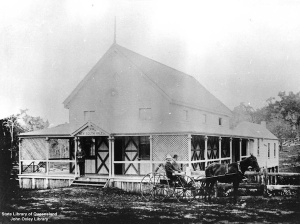Wrong side of the tree line
by Paul Howarth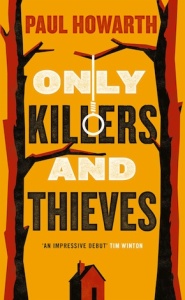
“A gripping novel… beautifully done.” Paulette Jiles
Central Queensland, Australia, 1885.
They stalked the ruined scrubland, searching for something to kill. Two boys, not quite men, tiny in a landscape withered by drought and drenched in unbroken sun. Vast plains pocked with spinifex and clumps of buckbush, grass brittle as old bone, red soil fine as gunpowder underfoot. There’d not been rain for a year. The whole bush smelled ready to burn. Dust blew in rivulets between the clutches of scrub and slid in great sheets over open ground. No cattle grazing here. What remained of the mob was down valley, closer to the creek, where the water ran in a trickle through a trough of dry mud and the surrounding floodplain offered the last of the feed. Now all that lived in these northern pastures were creatures meant for the terrain: lizards, snakes, spiders; possums, dingos, roos. Often there’d be rabbits but even the rabbits knew to shelter from the afternoon sun. Only the flies were moving; there was nothing for the brothers to hunt.
They paused and stood together with their rifles down, grimly surveying the surrounds, breathing hard, the air too hot and thick to properly fill the lungs. The older of the pair took off his hat, wiped his brow with his wrist, spat. He settled the hat back on his head. It didn’t fit him well. The younger’s fit him even worse. Tommy and Billy were fourteen and sixteen years old, and both wore their father’s old clothes: tan moleskin trousers tied off with a greenhide belt, dark and sweat- stained shirts. They exchanged a weary glance and stood waiting. A light breeze blew. The shrill rattle of cicada screams. Flies covered the boys’ shirt backs and crept towards their eyes and earholes until a casual swipe of the hand flicked them away. That lazy stockman’s salute picked up from their old man, or something they were born with, maybe. Flies had been coming at them their entire lives; they’d been fighting them off since the crib.
“Well,” Billy said, “I reckon we might as well quit.”
“She won’t be happy.”
“She can please herself. It ain’t our fault there’s a drought.”
Tommy opened his flask, tilted back his head, eyes closed against the sun, and drank. The water tasted stale and metallic and caught in the back of his throat. He winced as it went down, a childlike revulsion against the taste. Still some boy left in him yet: whereas Billy now had stubble and their father’s broad frame, Tommy’s body was slender, his nose was freckled, his eyes a watery blue. His hair was fairer than his brother’s too, tints of red in a certain light, which came from their mother’s side. She was Irish, their father Scots, and there was English blood in both lines. If they were dogs they’d have been called mongrels. Australian was a whole new breed.
Billy held out his hand out for the water, Tommy passed it across, and as his brother drank Tommy’s gaze wandered over that barren and rubbled ground to the thin blue gum forest that marked the northern boundary of their run, shrouded in a fine eucalyptus mist.
“Hey,” he said, nodding. “Be shade in them trees.”
Billy lowered the flask. “I ain’t hot.”
“Me either. I mean the rabbits. Might even find us an old-man roo.”
Billy scoffed, flicked water at Tommy’s face.
“Don’t bloody waste it,” Tommy said, wiping himself down. “That’s all there is left.”
“Tastes like foot wash anyhow.”
“Give it here then.” Tommy took back the flask and stoppered it. “So, what about them trees?”
It was already an hour’s walk back to where they’d tied the horses in a stand of ironbarks, might be half that again by the time they reached the blue gums, and then the long ride home. Most likely all for nothing.”
Billy considered it a moment, then set off walking north. Tommy followed. The cicadas fell silent. The only noise out there the scuff of their boots and whisper of their moleskins as they trudged through the rocky scrub. Tommy checked behind them as he walked. Mile after mile of empty terrain – it was already an hour’s walk back to where they’d tied the horses in a stand of ironbarks, might be half that again by the time they reached the blue gums, and then the long ride home. Most likely all for nothing. Neither had fired his rifle since they’d left the house just after noon, or even taken aim.
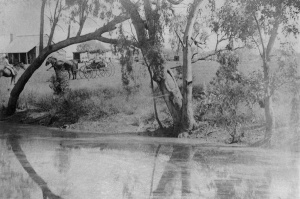
Outstation of Mount Enniskillen station on the Barcoo River, Queensland, 1885. State Library of Queensland / Wikimedia Commons
It was cooler in the trees. Shadow dappled the forest floor. Deadfall and leaves crunched underfoot, a taint of eucalyptus in the air. With their rifles raised the brothers began flushing between the trunks, some tall and white, others gnarled and twisted by the sun. They moved slowly. Scanning side to side, heads cocked to listen, silence all around. With the dogs they might have fared better, but Father had them for work. He never spared them: poor old Red and Blue.
Suddenly something bolted, crashing away through the brush, Billy first after it, Tommy just behind, both of them tearing between the trees, jumping fallen logs and bulging roots, carrying their rifles two- handed, ready to aim, but the thing was always beyond them, never a clear view, a shadow slipping through the sunlight, until even the sound was so faint that Tommy could hear nothing over his own ragged breathing. He slowed and then stopped, his hands on his knees, Billy coming back towards him, calling, “What you quit for? What’s wrong?”
Tommy shook his head. “It’s gone.”
“We might have caught it yet.”
“You get a look see what it was?”
“Dingo, I reckon.”
“Dingo would have fought us. That quick, likely an emu.”
They recovered their breathing, Tommy leaning against a smooth-barked trunk, Billy peering through the thinning trees to where the forest ended and the next tract of open ground began.
“You know what’s over there?”
“Course I do,” Tommy said. Broken Ridge cattle station accounted for almost the entire district; excepting their own selection, and one or two others like it, there was not much this side of Bewley that wasn’t the squatter John Sullivan’s land.
“Want to take a look?”
“What for?”
“You ain’t curious?”
“We should be getting back.”
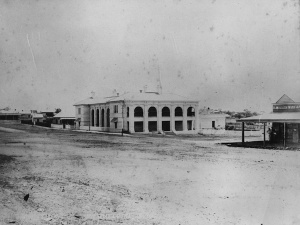
Courthouse on Herbert Street, Bowen, north Queensland, c. 1885. State Library of Queensland / Wikimedia Commons
But Billy was already moving, weaving through the trees. Tommy let him go. He cleared his nose, took another drink from the flask. Billy called for him to come. He was standing at the tree line, waving like he’d discovered virgin land. Tommy sighed, trudged after him, then stood with his brother looking out over the fringe of a landholding a hundred times the size of their own. Broken Ridge was no selection: Sullivan’s grandfather had been the first white man to settle this part of the frontier, had taken all he could defend, no purchase, no lease, and the next two generations had pushed the boundaries further still. Now John Sullivan owned the entire district – and everyone in it, Father claimed – without so much as a shilling having ever been paid.
The immediate terrain was familiar: bare ochre earth scattered with boulders and scree, termite mounds as tall as a man. But where the land opened out and sloped into the valley, Tommy could see a distant meadow with what looked to be Mitchell grass growing improbably lush and green, the dark shapes of livestock dotted throughout. Beyond the meadow and the tree-lined patchwork of surrounding paddocks and fields, the jagged red ridge for which the station was named sawed against the sky, the foothills part-shadowed as if wildfire- scorched.
“One man,” Billy said quietly. “One man owns all of that. And here’s Daddy barely making it still. All these years, and we ain’t worth the dags on Sullivan’s arse.”
Tommy looked at him sideways. “You might not be.”
“I mean it. When I get my own run…”
Billy drifted into silence, the dream of it, his long-held plans.
Tommy said, “We should go.”
“We ain’t doing no harm.”
“You know what Daddy would say. Anyhow, it’s a long ride home.”
Billy smirked at him, then stepped deliberately from the tree line, spread his arms and turned around. “See? What did you reckon, the ground would give out?”
He shouldered his rifle on the strap and swaggered away. Tommy cursed, ran after him, and together they wandered cautiously between rock mounds ringed by snake tracks, more clumps of spinifex, occasional mulga trees and Moses bushes and the flat-leaf tendrils of prickly pear. The valley opening before them, the pastures running on and on… it seemed incredible to Tommy that Sullivan’s land could be fed by the same creek that flowed barely shin-high on their own. Unless it wasn’t – there might have been another river that Tommy didn’t know. It was possible. Broken Ridge was big enough that there could easily have been two.
Trailing behind them were three native men chained together at the necks, running in the dust thrown up by the hooves and struggling to keep their feet.”
They’d been walking less a mile when Tommy saw the first horse coming over the rise. He threw out a hand and grabbed Billy by the shirt and pulled them both down to their knees, his eyes on the horse all the while. It was heading east to west, only five hundred yards away, and was ridden by a very tall man, sitting fully erect in the saddle, wearing a slouch hat and longcoat flapping open at the sides. After him came another rider, this one small and hatless, then a further five horses, seven in all, trotting in a single-file column. Trailing behind them were three native men chained together at the necks, running in the dust thrown up by the hooves and struggling to keep their feet. Whenever one fell the others did too, causing the convoy to halt and the rearmost rider to shout and curse and yank on the chain, hauling them upright in a clumsy jerking dance, whereupon the convoy would move forward until the next man fell, and the dance started over again.
All this the brothers watched wide-eyed, neither of them speaking, barely breathing so it seemed, until finally Billy took Tommy’s arm and dragged him in a crouch to a pair of Moses bushes growing side by side. They sprawled on their bellies and crawled underneath, thorns snagging their shirt backs and scraping their skin, wriggling far enough through to see the convoy again. Once more it had stalled. Another of the men had gone down. The rider yelled and pulled the chain, but this time there was no response. The group watched and waited. The rider got down from his horse. He was wearing a kind of police uniform, as were three of the others: white trousers, blue tunic, peaked hat. He walked over to the fallen native and kicked him. The native shifted in the dirt. The trooper slapped the other two about their heads, then kicked the man again. When still he didn’t rise, the trooper returned to his horse, pulled a rifle from his pack and looked towards the front of the line. The tall man nodded. The trooper stood over the native, aimed and fired.
Tommy saw the body flinch before the sound of the shot came tumbling over the plains. A noise escaped him. A soft and high-pitched breath. He could feel his heart hammering against the ground as the fading rifle report was followed by a muted cheer. The other riders were clapping. The trooper gave a little bow. He bent and uncuffed the body from the neck chain then bullied the remaining men into line. They rose cowering behind their hands. The trooper shook out the chain and remounted his horse, but the party didn’t move on. The front two men were talking. The tall man extended an arm and pointed to where Tommy and Billy hid. Other heads turned their way. Then all but the last horse broke into a gallop and fanned wide across the plain and Tommy gave out a moan like a just-kicked dog.
“Keep quiet,” Billy whispered. “Don’t move.”
On the horses came. The ground rumbled with their hooves. Billy was edging backwards and was almost out of the bush when Tommy realised he was gone. He pawed at his brother’s collar; Billy brushed him off and warned him again not to move. “Don’t!” Tommy was saying. “Don’t!” But Billy was almost out now, shuffling himself clear, the shock in his face like a man falling, clutching at the air.
Through the branches Tommy watched him rise slowly to his feet and lift his rifle above his head, barely the strength to manage it, his whole body wilting as the horses bore down, full gallop still, and not fifty yards away. Billy stepped into the clearing, everything trembling, his legs jagging back and forth, stumbling backwards as the riders reined their horses so late they were almost upon him, turning his head against the dust cloud that washed over him on the wind.
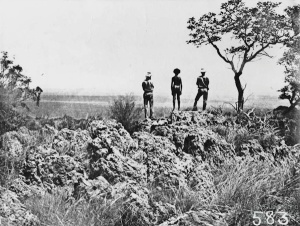
Native Police on lookout, 1860s. Queensland Historical Atlas
Two riders came out of the line, walking their horses slowly on. Tommy recognised both of them – John Sullivan and his offsider, Locke – but the troopers were like no kind of police he’d ever seen. They were black. Three uniformed natives, rifles in their hands, cartridge belts slung across their chests. The tall man in the longcoat was white and very slim; he kept back from the group and began with the makings of a pipe, as Sullivan and Locke drew up directly in front of where Billy stood. Sullivan was plump and red-faced and wore a stained and sodden shirt carved by braces digging into his chest. Thinning hair sprouted wildly from his scalp, and his little eyes pinned Billy in a glare. Beside him, Locke chewed on his tobacco like a cow at her cud, his face in shadow beneath the brim of his hat, stubbled jaw working up and down. A short-blade sword hung at his side; it glinted as he leaned in the saddle and spat a thick string of brown saliva onto the ground by Billy’s boots. Billy lowered his rifle. He lifted his eyes towards the men.
“You would be one of Ned’s boys, I take it?” Sullivan said.
“Yessir, Billy McBride.”
“And the other one? I forget now, which of you’s which?”
Tommy’s innards quickened. Billy glanced across but didn’t answer. Sullivan said, “Either he comes out himself or we’ll fetch him – however you prefer.”
Father kept the children hidden whenever Sullivan came to the house, sent them to the stables, the barn, the sheds. It hadn’t always been like that.”
Tommy’s head hung. He blinked into the dust. Dryly he swallowed, then with his rifle in his hand he shuffled out of the bush and walked meekly in front of the group, eyes down, couldn’t meet their stares. When he reached Billy’s side he stood so close to his brother that their arms and shoulders touched. Fingers brushing fingers; neither pulled away.
“Well, it’s been a while,” Sullivan said. “You’re almost fully grown.”
Father kept the children hidden whenever Sullivan came to the house, sent them to the stables, the barn, the sheds. It hadn’t always been like that – Tommy remembered the squatter once giving him a small wooden horse, which only years later had Father taken from him and burned.
“So,” Sullivan said, dropping the reins and folding his arms, “you want to tell me what you’re doing with them rifles on my land? Your old man send you up here? Not doffing my cattle, were you, boys?”
“No, sir,” Billy said. “We was hunting rabbits and got lost, that’s all.”
“Got lost? Missed the tree line when you crossed it, did you?”
“There was a dingo,” Billy said hopefully. “Or a emu, we wasn’t sure. We chased it and forgot where we was. We wasn’t duffing, I swear.”
Sullivan sniffed and looked about, as if searching for proof.
“Thing is, son, whether it’s a dingo or emu or bloody kangaroo, once it’s this side of the trees it’s mine to hunt not yours. Didn’t your father teach you where the boundary between us lies?”
“Yessir,” Billy said quietly. “But, ain’t them things everyone’s? On account of they’re wild?”
“Sounds just like a nigger,” Locke said. He twisted around to look at the two distant captives and the trooper holding their chains and spat.
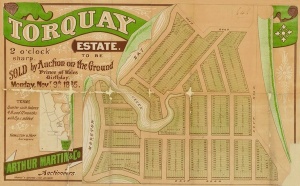
Property auction poster, Redland Bay, Queensland, 1885. State Library of Queensland / Wikimedia Commons
“No, son,” Sullivan said. “No, they’re not.”
In the silence that followed, Tommy glanced at the tall man sitting at the back of the group. He was smoking his pipe and gazing disinterestedly into the scrubs, smoke dribbling from under his moustache and drifting over his face like a caul. His skin was stretched tightly over his cheekbones, and his eyes were soft and milky, no colour in them at all, fogged like a lantern whose wick has burnt out.
Sullivan said, “You’re wondering about my associates here… well, the man at the back there is Inspector Edmund Noone of the Native Mounted Police. These are his troopers. As I’m sure you know, their business is the dispersal of those who don’t belong. Chiefly that means myalls, but Mr Noone’s talents aren’t particular to the colour of a man’s skin: boys, he knew you were hiding in those bushes probably before you even got there yourselves.”
Noone turned his gaze on them. Tommy looked immediately at the ground.
“Now usually,” Sullivan continued, “Mr Noone will punish trespassers to the fullest extent of the law. To disperse them, as it were, as you have just seen. But since he’s here on my account, and since this is my land, I suppose I have a say.
So, here are the terms: first, that I never catch you past them trees again…”
He paused and looked at Billy, who nodded eagerly in reply.
“And second, that you tell your father what happened here today, understand?”
“Yessir,” Billy said. “Yessir, we will.”
“And you?”
Billy elbowed Tommy in his side. He nodded.
“He don’t speak for himself? To my thinking a deal should be agreed out loud.”
“Say it,” Billy hissed.
“Yessir.”
“Good,” Sullivan said, taking up his reins. “Then on your way.”
The boys backtracked hesitantly, as one by one the group turned their horses and rode towards the trooper holding the two chained men. Only Noone remained. Still smoking his pipe, watching the boys like he hadn’t noticed the others leave. His gaze was steady and firm and his eyes were very white. Tommy felt that gaze run through him. It tiptoed down his spine. Billy tugged on his arm, pulled him away, and they set off scrambling for the distant trees.
The first time Tommy looked behind him, Noone was still there, watching. The second time he looked, he was gone.
From Only Killers and Thieves (ONE, £17.99)
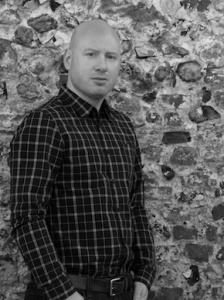 Paul Howarth was born and grew up in the UK before moving to Melbourne in his late 20s. He lived in Australia for over 6 years, and now lives in Norwich with his family. He graduated from the UEA Creative Writing MA in 2015 and was awarded the Malcolm Bradbury Scholarship. Only Killers and Thieves is published by ONE, an imprint of Pushkin Press.
Paul Howarth was born and grew up in the UK before moving to Melbourne in his late 20s. He lived in Australia for over 6 years, and now lives in Norwich with his family. He graduated from the UEA Creative Writing MA in 2015 and was awarded the Malcolm Bradbury Scholarship. Only Killers and Thieves is published by ONE, an imprint of Pushkin Press.
Read more
@paulhowarth_

